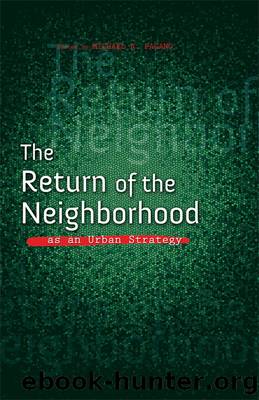The Return of the Neighborhood as an Urban Strategy by Michael A. Pagano

Author:Michael A. Pagano [Pagano, Michael A.]
Language: eng
Format: epub
ISBN: 9780252081415
Barnesnoble:
Goodreads: 25404135
Publisher: University of Illinois Press
Published: 2015-09-15T00:00:00+00:00
NEIGHBORHOOD AS A STRATEGY OF TRANSFORMATION
The policy environment for neighborhood revitalization continued to move in neoliberalized directions in the Clinton and George W. Bush administrations. As the centerpiece of his ânew covenantâ with urban America, Bill Clintonâs Empowerment Zone/Enterprise Community initiative folded community participation requirements and interagency coordination into what was basically a variation on the enterprise zone idea: tax incentives for private investment meant to make designated neighborhoods more competitive in the global economy. While managing to restore some funding for low-income housing supplements, the Clinton administration also continued the emphasis on promoting self-sufficiency and enforcing tough behavioral sanctions on public-housing tenants, an emphasis reinforced by Clintonâs controversial signing of the welfare-ending Personal Responsibility and Work Opportunity Reconciliation Act of 1996. In contrast, the administrationâs crime bill injected comparatively massive amounts of funding into drained city coffers, most of it targeted to added law enforcement and community policingâand contributed to a huge increase in African American incarceration rates with its âthree strikesâ and felony drug provisions and added funding for prison construction.64 Meanwhile, ignoring warning signs from the 1987 stock market crash and the savings and loan crisis of the late 1980s and early 1990s, both Clinton and Bush accelerated the financial deregulation initiated during the Carter years, in what was becoming a bipartisan trend. Caught up in the romance of mortgage-backed securitization and the expanding market for subprime loans, both administrations made homeownership the real centerpiece of their low-income housing policy, while continuing to move the federal government out of the business of providing public housing by implementing the planned demolition of the most âseverely distressedâ projects under the Homeownership and Opportunity for People Everywhere Act of 1992 (HOPE VI).65
In this neoliberalized policy environmentâof exuberant faith in the market and diminished expectations of what government could or should provideâlocal policymakers and practitioners began to embrace the idea of neighborhood âtransformationâ as a strategy of urban development in the 1990s. Versions of that idea inspired a number of ambitious initiatives that took place alongâand in some cases contributed toâthe ever more bifurcated lines of late-twentieth- and early-twenty-first-century capitalism. Those initiatives underscored how disconnected from a sense of public purpose and capacity the idea of neighborhood initiative had become.
Thus, one version of neighborhood transformation has led to gentrification on an unprecedented scale, as entrepreneurial city officials redoubled their downtown redevelopment campaigns to capitalize on the residential real estate and hi-tech booms, as well as the investment income of the global 1 percent.66 Although examples exist of more deliberate mixed-income gentrification strategies that aim to avoid displacement, what remain for the most part market-driven upscaling campaigns have put lower-income residents, renters, and local businesses at a substantial structural disadvantage against rising property values, disapproving newcomers, and distant landlords eager to raise rents.67 The ongoing implementation of HOPE VI has also raised concerns about what neighborhood âtransformationâ will mean for former tenants. Of the tens of thousands of displaced families, a relatively small percentage has returned to benefit from mixed-income replacement housing; most have moved from one poor neighborhood to another.
Download
This site does not store any files on its server. We only index and link to content provided by other sites. Please contact the content providers to delete copyright contents if any and email us, we'll remove relevant links or contents immediately.
The Secret History by Donna Tartt(16658)
The Social Justice Warrior Handbook by Lisa De Pasquale(11494)
Thirteen Reasons Why by Jay Asher(7801)
This Is How You Lose Her by Junot Diaz(5799)
Weapons of Math Destruction by Cathy O'Neil(5046)
Zero to One by Peter Thiel(4834)
The Myth of the Strong Leader by Archie Brown(4795)
Promise Me, Dad by Joe Biden(4455)
Beartown by Fredrik Backman(4433)
Stone's Rules by Roger Stone(4422)
How Democracies Die by Steven Levitsky & Daniel Ziblatt(4413)
The Fire Next Time by James Baldwin(4350)
100 Deadly Skills by Clint Emerson(4085)
A Higher Loyalty: Truth, Lies, and Leadership by James Comey(4039)
Rise and Kill First by Ronen Bergman(4020)
The David Icke Guide to the Global Conspiracy (and how to end it) by David Icke(3891)
The Farm by Tom Rob Smith(3878)
Secrecy World by Jake Bernstein(3788)
The Doomsday Machine by Daniel Ellsberg(3737)
